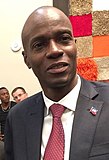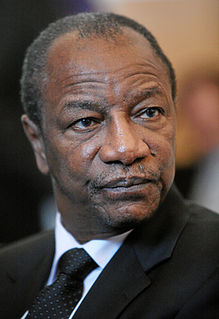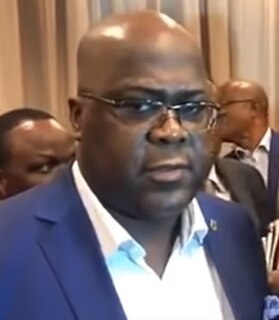| |||||||||||||||||
| |||||||||||||||||
| Registered | 5,871,450 | ||||||||||||||||
|---|---|---|---|---|---|---|---|---|---|---|---|---|---|---|---|---|---|
| Turnout | 28.8% | ||||||||||||||||
| |||||||||||||||||
| |||||||||||||||||
| This article is part of a series on the |
| Politics of Haiti |
|---|
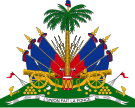 |
Legislature |
Executive |
Judiciary |
Recent elections |
| Foreign relations |
Presidential elections were held in Haiti on 25 October 2015, alongside local elections and the second round of the legislative elections. [1] Incumbent President Michel Martelly was constitutionally barred from running. As no candidate received a majority of the vote in the first round, a runoff was to be held on 27 December 2015. [2] Voter turnout was reportedly 28.8%. On 22 December the Conseil Electoral Provisoire announced that the runoff has been postponed indefinitely. [3] However, on 1 January 2016 President Michel Martelly announced that the runoff would be held on 17 January, [4] but on 7 January the President changed the date to 24 January. On 20 January, Jude Célestin issued a statement that calls "whatever the person who will participate in this January 24 [runoff], is a traitor to the Nation". [5] Because of rioting and electoral violence, on 22 January the CEP decided to postpone the second round again, with no specific date given, [6] even after President Michel Martelly confirmed the previous day in a nationwide speech that the election should still take place. [7] The run-off date was later agreed to take place on 24 April 2016. [8] However, according to Reuters [9] and several [10] other sources, the runoff is postponed again with an indeterminate date most likely after October 2016. United Nations Secretary-General has expressed deep concern that the agreed upon date for holding elections in Haiti was not met and that no alternate electoral calendar was announced. [11]

Haiti, officially the Republic of Haiti and formerly called Hayti, is a country located on the island of Hispaniola, east of Cuba in the Greater Antilles archipelago of the Caribbean Sea. It occupies the western three-eighths of the island, which it shares with the Dominican Republic. Haiti is 27,750 square kilometres (10,714 sq mi) in size and has an estimated 10.8 million people, making it the most populous country in the Caribbean Community (CARICOM) and the second-most populous country in the Caribbean as a whole.
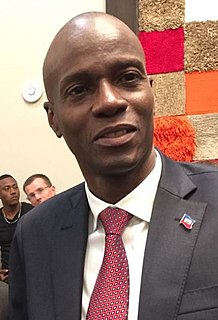
The President of Haiti, officially called the President of the Republic of Haiti is the head of state of Haiti. Executive power in Haiti is divided between the president and the government headed by the Prime Minister of Haiti. The current president is Jovenel Moïse, who took office on February 7, 2017.

Michel Joseph Martelly is a Haitian singer and former politician who went on to serve as the President of Haiti from May 2011 until February 2016. He is from Côte-de-fer, a commune located in the South East region of Haiti. Martelly was one of Haiti's best-known musicians for over a decade, going by the stage name Sweet Micky. For business and musical reasons, Martelly has moved a number of times between the United States and Haiti. When travelling to the United States, Martelly mostly stays in Florida. After his presidency, Martelly returned to his former band and sung a carnival meringue entitled Bal Bannan nan, a message as a response to Liliane Pierre Paul, a famous Haitian female journalist in Port-au-prince.
Contents
On 5 April 2016, the Electoral Committee announced that a whole new presidential election should take place on 9 October, alongside with the second round of the parliamentary elections that has been suspended and the first round for a third of the Senate. [12]
